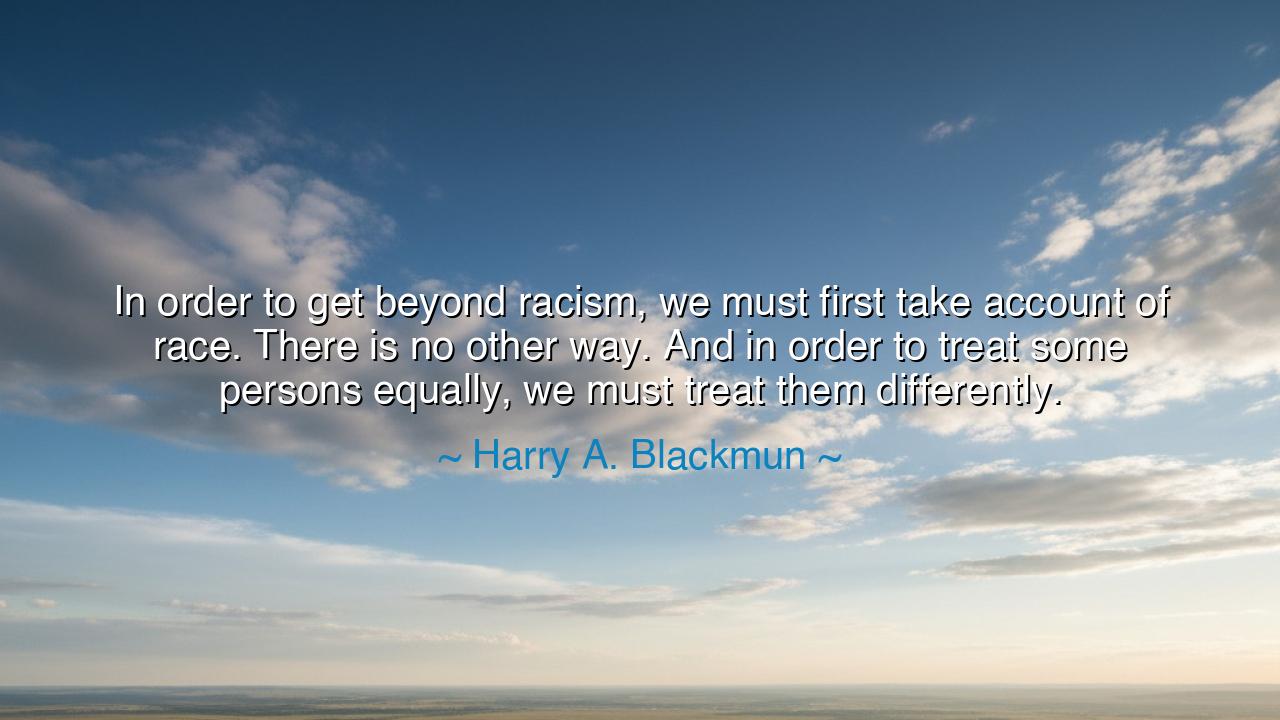
In order to get beyond racism, we must first take account of
In order to get beyond racism, we must first take account of race. There is no other way. And in order to treat some persons equally, we must treat them differently.






“In order to get beyond racism, we must first take account of race. There is no other way. And in order to treat some persons equally, we must treat them differently.” So spoke Justice Harry A. Blackmun, whose words carry the weight of moral thunder disguised in judicial calm. In this declaration lies a paradox both profound and necessary—a truth that strikes at the very heart of justice. For equality, though it be the dream of all noble minds, cannot be born from blindness. To heal, one must first see; to mend, one must first acknowledge the tear. Blackmun’s words are not a call to division, but to reckoning—a reckoning with history, with prejudice, and with the false comfort of ignorance.
Many in their innocence cry out, “Let us not speak of race! Let us be color-blind!” But this blindness, though it wears the mask of virtue, is itself a shadow that hides injustice. Racism, ancient and enduring, has carved deep wounds into the fabric of humanity. To pretend those wounds do not exist is to let them fester unseen. Blackmun reminds us that true equality cannot be built upon denial. Just as the physician must first look upon the sickness before prescribing the cure, so must society confront the realities of inequality before it can dream of peace. To take account of race is not to perpetuate division—it is to face the truth that centuries of oppression cannot be undone by mere silence.
In the long annals of time, let us recall the story of Brown v. Board of Education in 1954, the great turning of the tide against racial segregation in America’s schools. The Court declared that “separate but equal” was a lie—a wound wrapped in the language of fairness. Yet even after this victory, inequality endured, not by law alone, but by the slow poisons of poverty, prejudice, and exclusion. When Justice Blackmun later spoke his words in defense of affirmative action, he spoke as one who had seen this truth: that to treat all as though they start from the same ground is to enshrine injustice, not to end it. The runner who begins the race miles behind cannot reach the finish line by being told the rules are now fair.
The ancients would have understood this wisdom well. For they knew that balance is not the same as sameness. The wise ruler does not give the same portion of food to the starving and the full; the healer does not prescribe the same remedy to the healthy and the afflicted. Justice is not a scale weighed by blindness but by discernment—by knowing who has been burdened by history’s hand, and who has walked unencumbered by it. To treat some persons differently is not to favor them—it is to lift them to the place where equality can finally breathe.
Consider the life of Thurgood Marshall, who rose from the shadows of segregation to become the first Black Justice of the Supreme Court. His journey was not one of equal beginnings, but of unequal courage. He faced locked doors, scornful stares, and laws written to deny him dignity. Yet, through his struggle, America saw that justice must sometimes bend toward mercy before it can stand upright in fairness. His triumph did not erase difference; it transformed it. The difference that had once been weaponized became a testament to strength and endurance.
Blackmun’s wisdom, therefore, is both fierce and compassionate. He tells us that equality is not a single act but a process—a climb from the valley of history’s injustices toward the mountain of shared humanity. Each generation must take account of the shadows that linger behind them, or else risk walking blindly into the same abyss. It is not weakness to acknowledge difference; it is courage. It is not unfair to lift the fallen first; it is justice. Only when the balance has been restored can the blindfold of equality truly be worn without deceit.
The lesson, then, is this: Equality requires vision. Justice requires humility. Look upon the world not as you wish it to be, but as it is—and then labor to make it fair. Seek not to erase difference, but to honor it. Lift those who have been pressed down, not out of pity, but out of duty to the truth. For when all have stood upon equal ground, when history’s weight has been shared and not ignored, then and only then will we have earned the right to call ourselves free.
So remember the wisdom of Harry A. Blackmun, children of tomorrow: equality is not born of blindness but of awareness, not of indifference but of compassion. The dream of justice is not achieved by pretending the past did not happen—it is achieved by healing its wounds with honest hands. Walk, therefore, with open eyes and humble hearts, and let your fairness be not an illusion of sameness, but a triumph of understanding.






AAdministratorAdministrator
Welcome, honored guests. Please leave a comment, we will respond soon